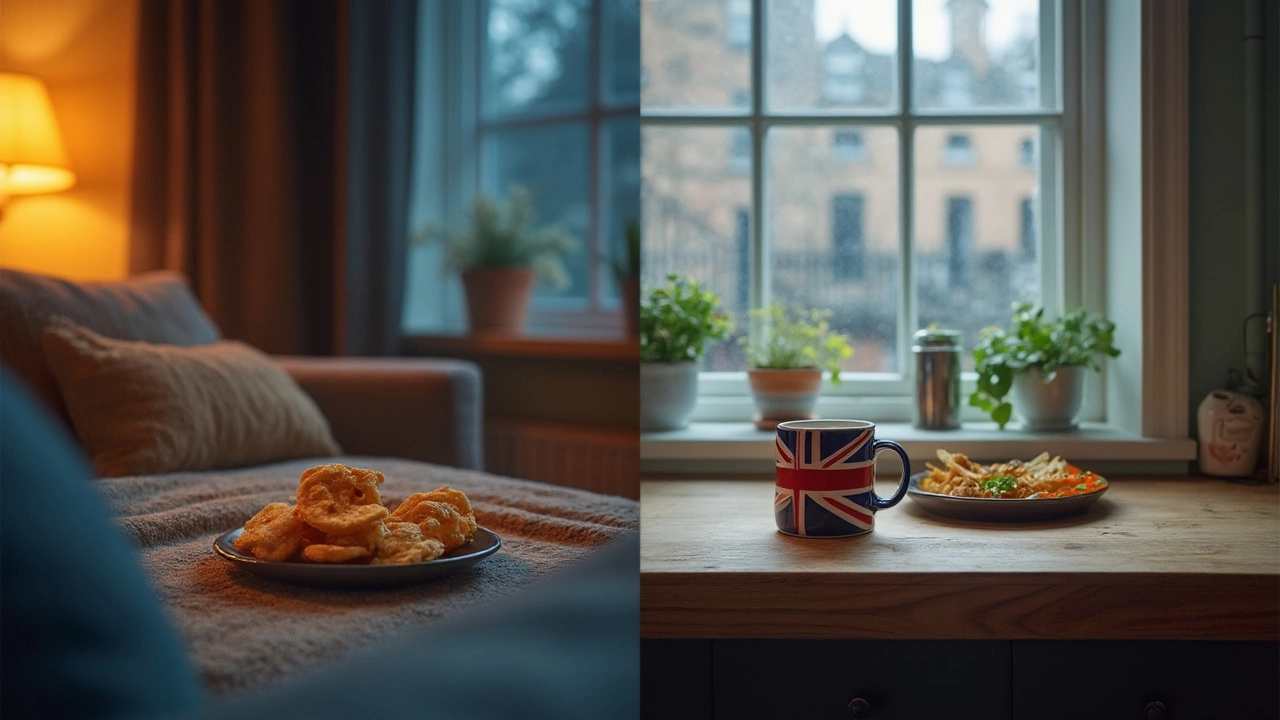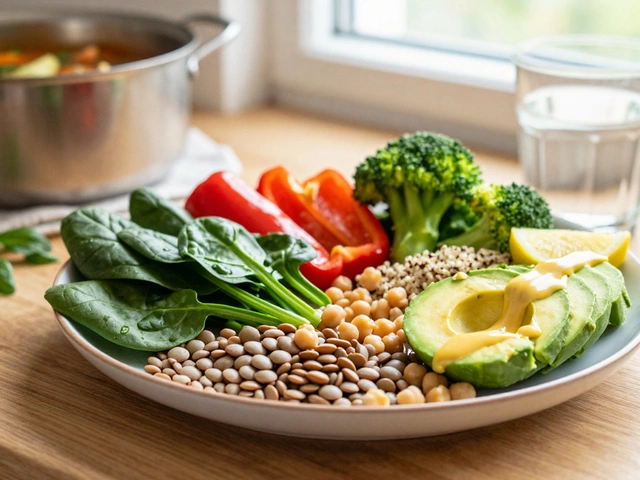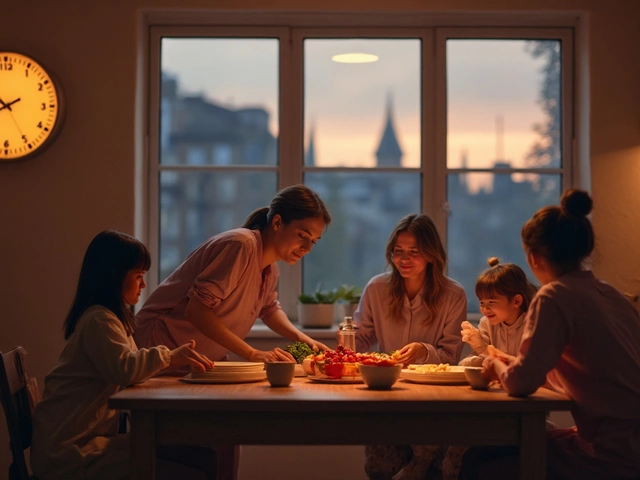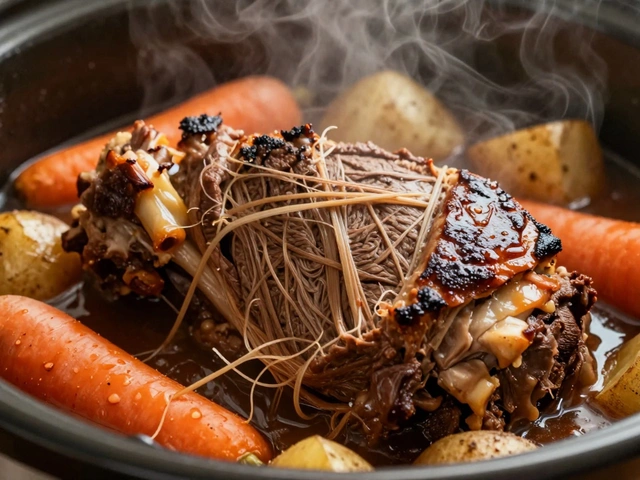
Ever notice how eating late at night just feels heavier—not just on your stomach, but on your goals too? There’s real science behind this. When you eat matters almost as much as what you eat, especially if your main target is the stubborn belly fat that never seems to budge.
Meal timing isn't magic, but it does help your body manage energy and fat burning. Your body has its own clock, called your circadian rhythm, and it likes you to eat in sync with it. Most experts say eating late—think after 8 p.m.—gets in the way of how well your body processes food. Basically, your digestion slows as the night creeps in, and late-night snacks get more likely to end up stored as fat rather than burned for energy.
If you want a practical place to start, shoot for wrapping up dinner a few hours before bed. For most people, that’s around 7 or 8 p.m. This gives your body time to process your meal before you wind down. Plus, quitting snacking in the evening can help you control those sneaky calories that push your daily total over the line—without you even realizing it.
- How Meal Timing Impacts Belly Fat
- Why Late-Night Eating Can Be a Problem
- Best Times to Stop Eating According to Science
- Ways to Curb Cravings in the Evening
- Easy Recipe Tips for Better Night Routines
How Meal Timing Impacts Belly Fat
What you eat matters, but when you eat can make a bigger difference in your fight against belly fat. Your body likes routine. If you eat meals around the same times every day, your metabolism responds better, which helps with fat burning. Eating at random hours, especially late at night, throws off your body's natural rhythm—the circadian rhythm. When this rhythm is out of sync, your body becomes less efficient at breaking down food and more likely to store extra calories as fat.
There are studies showing that people who finish eating earlier in the evening tend to burn more fat overnight. One study from 2023 out of the University of Alabama had two groups eat the same number of calories, but one group finished dinner by 6 p.m. and the other at 10 p.m. The early eaters lost more belly fat, even though calories and food quality were identical. This shows meal timing isn’t just a minor detail—it has real benefits.
Late-night meals also increase your chances of mindless snacking. Most of us don’t crave grilled chicken or salad at 10 p.m.; it’s usually chips, cookies, and other high-calorie snacks. This habit adds up fast and makes it tough to keep belly fat in check.
- Sticking to regular meal times helps your metabolism.
- Finishing dinner a few hours before bed supports better fat burning.
- Eating late raises your risk for overeating or picking unhealthy snacks.
If your schedule is hectic, just try to keep a three-hour buffer between your last meal and bedtime. That way, your body has a real shot to burn off extra energy and keeps belly fat from creeping up on you.
Why Late-Night Eating Can Be a Problem
Snacking after hours can feel harmless, but regular late-night eating does more than just add to your daily calorie count. Your metabolism naturally slows down toward the end of the day. So those post-dinner chips or cookies aren’t likely to be used as fuel—they're more likely to become stored fat. That's especially true for belly fat.
Your body’s internal clock, called your circadian rhythm, helps decide when to burn or store calories. If you eat late, research shows insulin sensitivity drops and fat storage ramps up. That means your body is less ready to handle any carbs and sugar you toss its way after dark. To back this up, a study in the American Journal of Clinical Nutrition found that people who ate after 8 p.m. regularly gained more weight over time than those who finished earlier—even if their total calories were about the same.
“Our bodies handle calories differently at night. When you eat late, your body is more likely to store calories as fat rather than use them for energy,” says Dr. Satchin Panda, a leading researcher in circadian rhythms.
There’s more: Eating late also messes with your sleep. Late-night meals can spike blood sugar and keep you awake longer, which just triggers more cravings for junk food the next day. Talk about a cycle that’s tough to break.
- Late-night eating is linked to higher body fat and higher risk of type 2 diabetes.
- Poor sleep from eating late triggers extra hunger hormones the next day.
- Belly fat is especially stubborn when you graze at night, compared to eating the same foods earlier.
| Eating Time | Average Weight Gain (Annual) | Impact on Sleep |
|---|---|---|
| Before 8 p.m. | 1.5 kg | Minimal |
| After 8 p.m. | 3 kg | High (more wake-ups, shorter sleep duration) |
If your goal is losing belly fat, pay just as much attention to when you eat as you do to what’s on your plate. Even small shifts—like moving dinner up an hour or cutting the snacks at night—can make a real difference over time.

Best Times to Stop Eating According to Science
If you’re aiming to lose belly fat, the time you cut off eating isn’t just a random guess. Research shows our bodies naturally process food better earlier in the evening. One widely cited study from a U.S. university found people who finished their last meal by 7 p.m. lost more weight and had lower belly fat compared to night snackers, even when eating the same total calories. That’s because your metabolism slows down at night, making it harder to burn off what you just ate.
Experts recommend syncing your last meal with your body’s circadian rhythm. Here's a practical list for everyday life:
- Aim to finish dinner 2–3 hours before bedtime. If you go to bed at 10 p.m., try to be done eating by 7 or 8 p.m.
- Stick to a consistent eating schedule—even on weekends. Late-night takeout on Saturday can throw you off for days.
- If you’re hungry after your usual cutoff, ask yourself if it’s boredom or real hunger. Most cravings after dark are more about habit than need.
Researchers also found that people who eat late tend to store more fat around the waist—not exactly the kind of souvenir anyone wants. Your body simply isn’t primed to deal with late-night calories, and instead of burning them, it stashes them away, especially as belly fat.
If your job or family routine makes it tough, focus on consistency. Even if you can't always eat early, set a cut-off that works most days. The key is routine, not perfection. Combining smart timing with balanced meals can make a real difference—your jeans will thank you.
Ways to Curb Cravings in the Evening
Evening cravings hit hard, especially when you’ve had a busy or stressful day. The trick is to spot what’s really behind those urges: are you actually hungry, or just bored or tired? Here’s a breakdown of action steps and some real-world data to help keep those cravings from wrecking your progress with belly fat.
- Don’t skip dinner. If you have a solid, filling dinner with enough protein, fiber, and healthy fats, you’re much less likely to want snacks later. Studies from the American Journal of Clinical Nutrition show high-protein dinners can reduce nighttime food intake by about 12%.
- Switch up your routine. People often eat out of habit, not because they’re hungry. Try going for a walk, reading, or calling a friend during your usual snack window.
- Pick smart snacks if you really need one. If you’re genuinely hungry, reach for a handful of nuts, Greek yogurt, or a sliced apple with peanut butter. These options don’t spike your blood sugar and keep you feeling full longer.
- Drink up. Thirst can disguise itself as hunger. If a craving hits, try a big glass of water or herbal tea first. Sometimes that’s all you need.
- Brush your teeth early. It sounds weird, but brushing your teeth signals your brain that eating time is over — and who actually wants to eat after that minty taste?
Check out this data—it’s surprising how little snacks add up during the evening:
| Snack Type | Average Calories (per serving) | Potential yearly extra weight (if eaten daily) |
|---|---|---|
| Potato Chips | 160 | ~7.5 lbs |
| Chocolate Bar | 210 | ~10 lbs |
| Apple (medium) | 95 | ~4.5 lbs |
Snack choices matter—keep them wholesome and you’ll stay on track without completely ditching all food after dinner. Try setting a kitchen “curfew” (like no food after 8 p.m.), and stick to it. It gets easier once your body adjusts, and your mornings will feel so much better too.

Easy Recipe Tips for Better Night Routines
If you want to drop belly fat, setting up a night routine makes things so much easier. The last meal of your day shouldn't be the heaviest—and loading up on carbs right before bed isn’t doing you any favors. Experts say lighter evening meals help your metabolism wind down the right way, and make it way less likely you’ll store extra fat overnight.
Try these easy changes to your evening grub:
- Grill, bake, or steam your protein instead of frying. Chicken breast, fish, or even eggs work great. Protein keeps you full, supports muscle, and is less likely to get turned into fat than a big plate of pasta.
- Swap the bag of chips for raw veggies like carrots, cucumbers, or bell peppers. Pair with some Greek yogurt or hummus if you want flavor but don’t want loads of extra calories.
- Go easy on the starchy sides. Want something hearty? Make cauliflower rice or zucchini noodles. Fast to prep and light on the stomach.
- If you need something sweet, slice up a fresh apple or a small bowl of berries—both are high in fiber, so they fill you up, but the sugar won’t spike your blood sugar if you keep the portions small.
Sticking to a regular eating window also helps. For a lot of people aiming to lose belly fat, finishing eating by 7:30 or 8 p.m. gives your body a solid break before sleep. People who squeeze all their meals into a 10- or 12-hour period every day sometimes see better results because their body spends more time burning fat overnight.
One last thing: hydrate! If you feel peckish after dinner, try a glass of water or caffeine-free tea. Half the time, hunger at night is actually just thirst or boredom talking. Simple tweaks like these can seriously power up your night routine—and help you wake up feeling lighter, not stuffed.





